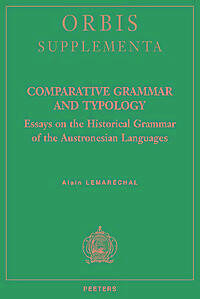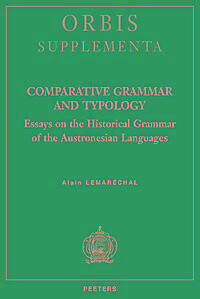
Je cadeautjes zeker op tijd in huis hebben voor de feestdagen? Kom langs in onze winkels en vind het perfecte geschenk!
- Afhalen na 1 uur in een winkel met voorraad
- Gratis thuislevering in België vanaf € 30
- Ruim aanbod met 7 miljoen producten
Je cadeautjes zeker op tijd in huis hebben voor de feestdagen? Kom langs in onze winkels en vind het perfecte geschenk!
- Afhalen na 1 uur in een winkel met voorraad
- Gratis thuislevering in België vanaf € 30
- Ruim aanbod met 7 miljoen producten
Zoeken
Comparative Grammar and Typology
Essays on the Historical Grammar of the Austronesian Languages
A Lemarechal
€ 159,95
+ 319 punten
Omschrijving
The comparative grammar of the Austronesian languages underwent an unprecedented change immediately after World War 2, owing to the use of lexicostatistics, the appeal to migration theory and the like, and also because of the idea of Formosa being the cradle of the language family. The present book is essentially an attempt at answering the following question: What would the comparative grammar of Austronesian look like in the absence of speculation on speaker migrations, and in the absence of the so-called "data" produced by lexicostatistics and glottochronology? Whereas typology is unable to offer the proof that a given language belongs to a group or subgroup of languages, grammaticalization theory can say whether a given state A may have preceded a state B or the reverse, and solid arguments are needed to propose a relative chronology between events that would be improbable, or even exceptional, in terms of the typology of linguistic change. This book revisits central issues of the comparative grammar of Austronesian languages from this angle, such as the history of person markers, particularly in the 2nd person, the genesis of the so-called "focus" verbal voice system and the typology of sentence structures. There is nothing in these domains that supports the supposition that Proto-Austronesian was very similar to the Formosan languages.
Specificaties
Betrokkenen
- Auteur(s):
- Uitgeverij:
Inhoud
- Aantal bladzijden:
- 368
- Taal:
- Engels
- Reeks:
- Reeksnummer:
- nr. 35
Eigenschappen
- Productcode (EAN):
- 9789042922549
- Verschijningsdatum:
- 21/01/2010
- Uitvoering:
- Paperback
- Formaat:
- Trade paperback (VS)
- Afmetingen:
- 157 mm x 239 mm
- Gewicht:
- 612 g

Alleen bij Standaard Boekhandel
+ 319 punten op je klantenkaart van Standaard Boekhandel
Beoordelingen
We publiceren alleen reviews die voldoen aan de voorwaarden voor reviews. Bekijk onze voorwaarden voor reviews.









